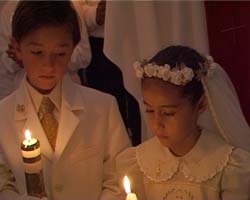 St. Pius X gave First Communion even to four-year-old children, requiring only that they could tell the difference between the Eucharistic Bread and ordinary bread and this criterion was included in the Decree «Quam singulari»:
St. Pius X gave First Communion even to four-year-old children, requiring only that they could tell the difference between the Eucharistic Bread and ordinary bread and this criterion was included in the Decree «Quam singulari»:
«(…) The age of discretion for receiving Holy Communion is that at which the child knows the difference between the Eucharistic Bread and ordinary, material bread, and can therefore approach the altar with proper devotion. Perfect knowledge of the things of faith, therefore, is not required, for an elementary knowledge suffices-some knowledge (aliqua cognitio); similarly full use of reason is not required, for a certain beginning of the use of reason, that is, some use of reason (aliqualis usus rationis) suffices. To postpone Communion, therefore, until later and to insist on a more mature age for its reception must be absolutely discouraged, and indeed such practice was condemned more than once by the Holy See.»
Therefore it is absolutely necessary that the child can distinguish Eucharistic Bread from ordinary bread.
However, the child has to «understand according to his capacity those Mysteries of faith which are necessary as a means of salvation» (ibid.)
What are these «necessary mysteries of Faith»? Cardinal Gennari, member of the Sacred Congregation for the Discipline of the Sacraments, explains it in his brief Commentary on the Decree:
«Here is what necessary instruction for first Communion consists of. The child must understand according to his capacity the main mysteries of faith, and
 |
be able to distinguish between the Bread of the Eucharist and ordinary bread. |
|
The main mysteries of the faith, as everyone knows, are the mysteries |
|
 |
of the unity and trinity of God |
 |
and of the incarnation, |
 |
of the passion and death of Our Lord Jesus Christ; |
|
to which we can add that |
|
 |
God, as a fair judge, eternally rewards the good with heaven and eternally punishes the wicked with hell. |
The child must know these mysteries as best as he can. Thus not perfectly, like theologians do, but he must be able to grasp their essence.» (Cardinal Casimiro Gennari, Commentary on the Decree Quam singulari)

It’s obvious that the child «will be obliged to learn gradually the entire Catechism according to his ability» (Decree Quam singulari)
Practical suggestions
 It’s advisable and in accordance with the real significance of the Sacrament that it be celebrated in intimacy and silence, in an atmosphere of prayer and unity with Jesus; for this purpose we recommend that the ceremony take place privately, without a large number of guests, so that it may be emphasized that there is only One Guest; without presents (except a few sacred objects), so that the child understands that there is only One Gift.
It’s advisable and in accordance with the real significance of the Sacrament that it be celebrated in intimacy and silence, in an atmosphere of prayer and unity with Jesus; for this purpose we recommend that the ceremony take place privately, without a large number of guests, so that it may be emphasized that there is only One Guest; without presents (except a few sacred objects), so that the child understands that there is only One Gift.
A solemn ceremony with the traditional participation of guests and relatives can be celebrated afterwards, bearing in mind however that Communion is above all a feast of the spirit.
As such, it must be lived out spiritually and not profaned by grandiose dinners, by ceremonies that are too luxurious and by material gifts or money gifts which obscure the spiritual freshness of the Sacrament.
It would be rightful to prepare the children with at least a one-day retreat, in peace and silence, without television.
St. Pius X urged those in charge to ensure that children – after their first encounter with Jesus in the Eucharist – regularly approach the Sacraments of Confession and, if possible, daily Communion and advance in gradual catechetic instruction.